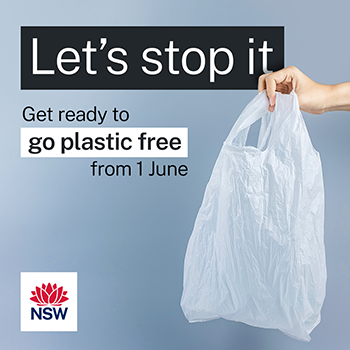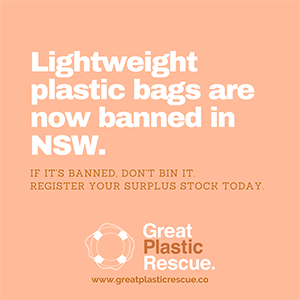Education on lightweight plastic bag ban the focus for compliance in NSW
Single-use plastics are on the way out with a ban on lightweight plastic bags from 1 June 2022 following laws passed by the NSW Government six months ago.
Businesses in NSW will no longer be able to give customers lightweight plastic bags (35 microns or less) from 1 June or to have them in stock. The ban applies whether a fee is charged or not.
The EPA has heard that some retailers may still hold stock of lightweight plastic bags and are seeking advice on how to comply with the law and what to do about them.
We are focused firstly on awareness and education for retailers and want to support them in making the switch to more sustainable alternatives, so they can be compliant with the new rules.
We have partnered with the National Retail Association which has engaged extensively with thousands of retailers across the state this year about the upcoming changes and what businesses need to do to comply.
We are committed to a fair and considered approach to regulation and that’s why we are focused firstly on awareness and education. We understand there may be different circumstances for different businesses and there is no ‘one size fits all’ response.
For example, we will look at whether a retailer has taken steps to prepare for the new requirements and made a genuine effort to comply. We will consider all circumstances when deciding on the most appropriate regulatory action. While we are in the introduction phase of the new bans it is only where we find suppliers being recalcitrant that we are likely to consider using stronger enforcement approaches.
We know that while a number of businesses have switched to non-plastic alternatives, some have existing stock as a result of unforeseen issues such as the lockdowns from Covid-19 resulting in the inability to rundown existing stock as intended.
We encourage small businesses to get in touch with the National Retail Association on strategies to help transition to compliant stock.
Where possible, we will work with businesses to identify avenues for recycling existing stock. In partnership with the Civic Futures Lab, the Great Plastic Rescue campaign will assist businesses to give leftover stock a second life, by collecting and recovering existing stock of banned items for recycling into new products.
Retailer assistance
To help retailers adjust to the change, the NSW Government has partnered with the National Retail Association to run an education campaign for small businesses across NSW showing how they can phase out and replace single-use plastics.
- Businesses, including retailers, suppliers, community groups and not-for-profit organisations, can contact the National Retail Association for advice on transitioning to compliant stock, engaging with suppliers and customers, and preparing for further bans on 1800 844 946 or email sustainability@nra.net.au.
- See more information for businesses
- Find out about compliance related to existing stock of lightweight plastic bags
Small businesses can also register with the Great Plastic Rescue for help to recycle excess banned lightweight plastic bag stock.
Larger organisations can search for a recycler using the business recycling database.
Plastic straw exemption for medical and disability use
People who need to use plastic straws for medical or disability reasons and the suppliers who provide or sell them in NSW will still be able to do so after the next stage of the plastics bans commence on 1 November, following an exemption granted by the EPA.
The NSW EPA is specifically empowered to grant the single-use plastic straws exemption under the Plastic Reduction and Circular Economy Act 2021 made in November last year.
This exemption will ensure that people who need access to plastic single-use straws for a disability or medical reason, or others acting on their behalf like carers, family and teachers, can continue to access them, and that suppliers can continue to legally stock them for the purposes of providing for people who need them, after the 1 November ban date.
Suppliers include hospitality venues that serve food and drink such as restaurants and cafes, as well as chemists, health facilities like medical, dental and nursing homes, and manufacturers, producers, wholesalers and online suppliers.
The EPA can grant exemptions to permit the continued supply of single-use banned plastic items, including for medical or health reasons.
See more information about the single-use plastic straw exemption, including guidance for individuals and suppliers
https://www.epa.nsw.gov.au/your-environment/recycling-and-reuse/plastics/exemptions-guidance-single-use-straws.
Plastic bags banned from 1 June:
- lightweight plastic bags of 35 microns or less (including compostable, biodegradable and bioplastic alternatives)
Plastics bags not banned from 1 June include:
- thicker plastic bags over 35 microns (such as bags at some supermarkets and boutique stores)
- barrier bags such as produce and deli bags, bin liners, compost caddy liners, nappy bags and pet-waste bags
Further plastic bans from 1 November will see the following items removed from circulation:
- single-use plastic straws, stirrers, cutlery, plates, bowls, and cotton buds (including compostable, biodegradable and bioplastic alternatives to these items)
- expanded polystyrene food ware and cups
- rinse-off personal care products containing plastic microbeads
We encourage you to consider the impact of this on your business now and to use up existing stock wherever possible.
The problem with plastics
The ban follows the passing of the Plastics Reduction and Circular Economy Act 2021 in November last year by the NSW Government. Its positive impact on our State’s environment will be profound.
Currently single-use plastic items and packaging make up 60 per cent of all litter in NSW. Single-use plastics remain in our environment for years and then eventually break down into microplastics. These plastic bans alone will remove almost 2.7 billion items from entering the NSW environment over the next 20 years. That’s billions of plastic items no longer going into our lakes, streams, beaches, oceans, and landfills.
Compostable, biodegradable and bioplastic alternatives are also captured by the ban because they are just as much of an environmental problem as traditional plastic. That’s because these so-called alternatives do not biodegrade unless they are specially treated in an industrial composting facility, so inevitably when littered they cause exactly the same problems.
Further plastic bans
Other plastic bans will follow from November 1, which will see the following items removed from circulation:
- single-use plastic straws, stirrers, cutlery, plates, bowls, and cotton buds
- expanded polystyrene food ware and cups
- rinse-off personal care products containing plastic microbeads.
The ban applies even if these items are made from biodegradable, compostable, or bio-plastics. This includes those made from Australian certified compostable plastic.
More information
See more information about the NSW plastics ban
Businesses, including retailers, suppliers, community groups and not-for-profit organisations, can contact the National Retail Association for advice on the NSW ban on 1800 844 946 or email sustainability@nra.net.au.
For all other enquiries, contact the EPA on 131 555 or email plastics@epa.nsw.gov.au.
If you need an interpreter to assist you, please call the Translating and Interpreting Service on 131 450 and ask them to call the NSW Environment Protection Authority (EPA) on 131 555. The interpreter will then help you with interpretation.



